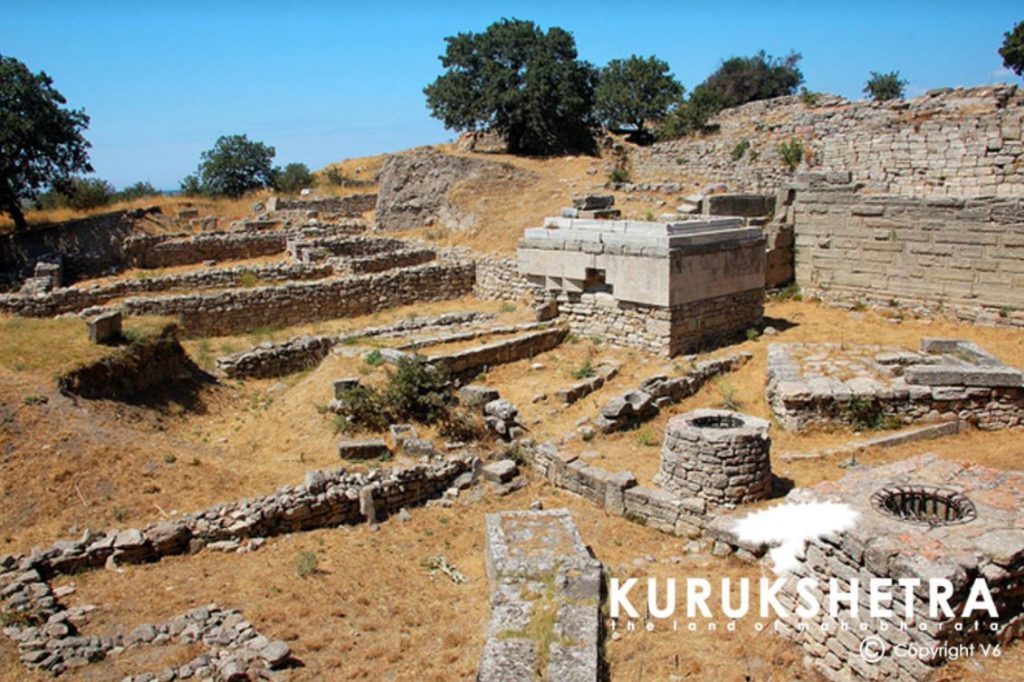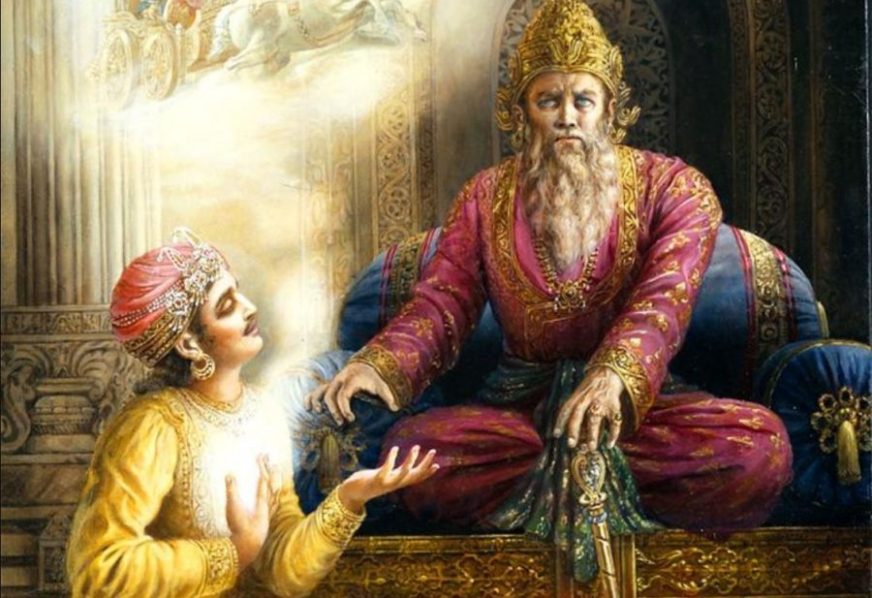In the part 1, we looked at the story behind the Bhagavad Gita. Let us now start reading the Gita.
Aum Ganapataye Namah!
Aum Namo Bhagavate Vasudevaya
Aum Namo Bhagavate Vasudevaya
Aum Namo Bhagavate Vasudevaya
Gurur Brahma Gurur Vishnu Gurur Devo Maheshwaraha
Guru Saakshaat Para Brahma Tasmai Sri Gurave Namaha
Om Shanti Shanti Shanti
Jump to the Commentary for Chapter 1, verses 1 to 10
The Bhagavad Gita – Chapter 1, Verse 1 to 10
Chapter 1, Verse 1
धृतराष्ट्र उवाच
धर्मक्षेत्रे कुरुक्षेत्रे समवेता युयुत्सवः।
मामकाः पाण्डवाश्चैव किमकुर्वत सञ्जय।।
dhṛtarāṣṭra uvāca
dharma-kṣetre kuru-kṣetre
samavetā yuyutsavaḥ māmakāḥ pāṇḍavāś caiva
kim akurvata sañjaya
Dhṛtarāṣṭra said: O Sañjaya, after my sons and the sons of Pāṇḍu assembled in the place of pilgrimage at Kurukṣetra, desiring to fight, what did they do?
Chapter 1, Verse 2
सञ्जय उवाच
दृष्ट्वा तु पाण्डवानीकं व्यूढं दुर्योधनस्तदा।
आचार्यमुपसङ्गम्य राजा वचनमब्रवीत्।।
sañjaya uvāca
dṛṣṭvā tu pāṇḍavānīkaṁ
vyūḍhaṁ duryodhanas tadā
ācāryam upasaṅgamya rājā vacanam abravīt
Sañjaya said: O King, after looking over the army arranged in military formation by the sons of Pāṇḍu, King Duryodhana went to his teacher and spoke the following words.
Chapter 1, Verse 3
पश्यैतां पाण्डुपुत्राणाम्
आचार्य महतीं चमूम्।
व्यूढां द्रुपदपुत्रेण
तव शिष्येण धीमता।।
paśyaitāṁ pāṇḍu-putrānām
ācārya mahatīṁ camūm
vyūḍhāṁ drupada-putreṇa
tava śiṣyeṇa dhīmatā
O my teacher, behold the great army of the sons of Pāṇḍu, so expertly arranged by your intelligent disciple the son of Drupada.
Chapter 1, Verse 4
अत्र शूरा महेष्वासा भीमार्जुनसमा युधि।
युयुधानो विराटश्च द्रुपदश्च महारथः॥
atra śūrā maheṣv-āsā
bhīmārjuna-samā yudhi
yuyudhāno virāṭaś ca
drupadaś ca mahā-rathaḥ
Here in this army are many heroic bowmen equal in fighting to Bhīma and Arjuna: great fighters like Yuyudhāna, Virāṭa and Drupada.
Chapter 1, Verse 5
धृष्टकेतुश्चेकितानः काशिराजश्च वीर्यवान्।
पुरुजित्कुन्तिभोजश्च शैब्यश्च नरपुङ्गवः॥
dhṛṣṭaketuś cekitānaḥ
kāśirājaś ca vīryavān
purujit kuntibhojaś ca
śaibyaś ca nara-puṅgavaḥ
There are also great heroic, powerful fighters like Dhṛṣṭaketu, Cekitāna, Kāśirāja, Purujit, Kuntibhoja and Śaibya.
Chapter 1, Verse 6
युधामन्युश्च विक्रान्त
उत्तमौजाश्च वीर्यवान्।
सौभद्रो द्रौपदेयाश्च
सर्व एव महारथाः।।
yudhāmanyu ca vikrānta
uttamaujā ca vīryavān
saubhadro draupadeyā ca
sarva eva mahā-rathāḥ
There are the mighty Yudhāmanyu, the very powerful Uttamaujā, the son of Subhadrā and the sons of Draupadī. All these warriors are great chariot fighters.
Chapter 1, Verse 7
अस्माकं तु विशिष्टा ये तान्निबोध द्विजोत्तम।
नायका मम सैन्यस्य संज्ञार्थं तान्ब्रवीमि ते।।
asmākaṁ tu vi iṣṭā ye
tān nibodha dvijottama
nāyakā mama sainyasya
saṁjñārthaṁ tān bravīmi te
But for your information, O best of the brāhmaṇas, let me tell you about the captains who are especially qualified to lead my military force.
Chapter 1, Verse 8
भवान्भीष्मश्च कर्णश्च कृपश्च समितिञ्जयः।
अश्वत्थामा विकर्णश्च सौमदत्तिस्तथैव च।।
bhavān bhīṣma ca karṇa ca
kṛpa ca samitiṁ-jayaḥ a vatthāmā vikarṇa ca
saumadattis tathaiva ca
There are personalities like you, Bhīṣma, Karṇa, Kṛpa, Aśvatthāmā, Vikarṇa and the son of Somadatta called Bhūriśravā, who are always victorious in battle.
Chapter 1, Verse 9
अन्ये च बहवः शूरा मदर्थे त्यक्तजीविताः।
नानाशस्त्रप्रहरणाः सर्वे युद्धविशारदाः।।
anye ca bahavaḥ ūrā
mad-arthe tyakta-jīvitāḥ nānā- astra-praharaṇāḥ
sarve yuddha-vi āradāḥ
There are many other heroes who are prepared to lay down their lives for my sake. All of them are well equipped with different kinds of weapons, and all are experienced in military science.
Chapter 1, Verse 10
अपर्याप्तं तदस्माकं बलं भीष्माभिरक्षितम्।
पर्याप्तं त्विदमेतेषां बलं भीमाभिरक्षितम्।।
aparyāptaṁ tad asmākaṁ
balaṁ bhīṣmābhirakṣitam paryāptaṁ tv idam eteṣāṁ
balaṁ bhīmābhirakṣitam
Our strength is immeasurable, and we are perfectly protected by Grandfather Bhīṣma, whereas the strength of the Pāṇḍavas, carefully protected by Bhīma, is limited.
Commentary for Chapter 1, verses 1 to 5
Now that you’ve read the story behind Bhagavad Gita, let’s look at chapter 1, verses 1 to 10 in detail.
The King Dhritarashtra, the father of the Kurus, knew fully well that whatever he and his sons had done to the Pandavas goes directly against Dharma and that the sacred land of Kurukshetra may not work in favour of them, but his righteous nephews, the Pandavas. Having known this, Dhritarashtra asks his secretary, Sanjaya, with so much doubt and fear – what is the situation at the battlefield of Kurukshetra!
The Gita says, “dharma-kṣetre kuru-kṣetre” – the field of wisdom and vision of eternal dharma! It is for no reason Kurukshetra is also called Dharmakshetra. It is believed that anyone who dies at Kurukshetra attains salvation – moksha – right away after their death! Kurukshetra is truly a holy land and it was named after the King Kuru who performed supreme sacrifices to bring prosperity to this land and its people! Dhritarashtra knew the sacredness of that land and was afraid that it would influence the outcome of the war. At no cost, he wanted his cousins and nephews to come to compromise and wanted to ensure that his sons succeed on the battlefield.

Dhritarashtra somehow knows that even though the Kauravas and the Pandavas belonged to the same Kuru family, the Kauravas including himself were blinded by greed and hatred. Where as, the Pandavas were all born naturally virtuous and follow the path of Dharma at all times. Dhritarashtra also knows that however much he calculates, Pandavas are right to have their equal share to the throne. Pandavas were even willing to negotiate it to an extent that they were ready to settle for just one house, regardless of the fact that their beloved wife, Draupadi, was disrobed and humiliated in front everyone in the court! Lord Krishna was present through all these negotiations by utilising “Sama dama danda bheda” – the four techniques available to solve any problems. Yet, blinded by greed and hatred, Dhritarashtra and his sons pushed the Pandavas to this huge war!
Dhritarashtra could have stopped this war. He could have put his foot down and asked his sons to stop and not to be driven by greed, mischief and hatred and to consider Pandavas as their brothers who have equal right to the throne. But he didn’t, instead, he too just instigated his sons to go to this war!
Dhritarashtra purposely didn’t want to address the Pandavas as Kurus even though the Pandavas are equally part of the Kuru dynasty. Pandu is his own brother. But he considered only his sons as Kurus. Dhritarashtra says, “māmakāḥ pāṇḍavāś caiva” – “My Sons and Pandu’s Sons…”, showing his strong attachment to his own people, forgetting the fact that, Pandavas too are his own children and that their father his own brother.
There is a reason why Dhritarashtra approaches his secretary Sanjaya. Sanjaya’s guru was Vyasa Maharshi and therefore, he was blessed and has the wisdom to envision what is really happening at the battlefield. Not only Sanjaya could see everything in the battlefield with his wisdom, but he could also hear what is happening and even hear what is happening in the minds of the people in the battlefield.
Sanjaya now starts to update his king, Dhritarashtra, who is blind, literally and spiritually, looking at the battlefield: “O, my king, Duryodhana has now gone to see his teacher, Dronacharya, after having a look at the Pandava army and their positioning in the battlefield and said to Dronacharya, “O my teacher, behold the great army of the sons of Pandu, so expertly arranged by your intelligent disciple, the son of Drupada.””
Son of Drupada is Dhrishtadyumna who was also trained by the same guru, Dronacharya. Dronacharya once had a quarrel with the King Drupada who is the father of Draupadi. Drupada performed a great sacrifice and was blessed with a son, Dhrishtadyumna, who would eventually be able to kill Dronacharya.
Dronacharya knew very well that Dhrishtadyumna could kill him, yet, being a noble guru, he trained Dhrishtadyumna with all the knowledge of Warcraft and military secrets. That same Dhrishtadyumna is now fighting with the Pandavas against the Kauravas. Dhrishtadyumna arranged the military phalanx using the knowledge he received from Dronacharya.
There is one thing we need to recall at this point. This conversation between Dhritarashtra and Sanjaya happens only on the 10th day of the battle (the battle lasted for 18 days) when Grandsire Bhishma, his commander in chief, fell by Arjuna’s arrows. Dhritarashtra was in utter shock hearing this news! To him, there was no one who could defeat Grandsire Bhishma which was rightly the case! That is when Dhritarashtra asks Sanjaya, how could Arjuna do this? Where did he get so much courage and to fall Grandsire Bhishma who is invincible? This is when Sanjaya started to describe his King, Dhritarashtra a flashback of the whole battle from day one.
Sanjaya goes on to explain about the heroic archers like Yuyudhāna, Virāṭa and Drupada in the battlefield who are equal in fighting Bhima and Arjuna. There are also other mighty warriors like Dhṛṣṭaketu, Cekitāna, Kāśirāja, Purujit, Kuntibhoja and Śaibya. In addition to that, there are other warrior who are equally powerful, like Yudhāmanyu, Uttamaujā, the son of Subhadrā and the sons of Draupadī. All these warriors are great chariot fighters.
Sanjaya continued to describe who else was in the battlefield as explained by Duryodhana to Dronacharya – about the captains who are extremely powerful and are adequately qualified to lead their army. There are warriors like Grandsire Bhīṣma, Karṇa, Kṛpa, Aśvatthāmā, Vikarṇa and the son of Somadatta called Bhūriśravā, who are always victorious in battle. There are many other heroes who are prepared to lay down their lives for my sake. All of them are well equipped with different kinds of weapons, and all are experienced in military science. Our strength is immeasurable, and we are perfectly protected by Grandfather Bhīṣma. However, the strength of the Pāṇḍavas, protected by Bhīma, is limited.
The reason why Duryodhana compares others with Bhima and Arjuna is because, he has tasted their wrath and strength multiple times whenever he tried to trick them into danger. Duryodhana once tried to poison and kill Bhima and thrown him into Ganga. However, Bhima went to Nagalok and met his great grandfather who is a serpent named Aryaka. On his advice, Vasuki gave Bhima 13 bowls of nectar, resulting in Bhima getting the strength of 100 elephants!
Thus Duryodhana was hopeful that their army would definitely defeat the Pandavas, with the help of Grandsire Bhishma and all other powerful warriors fighting with his army.
We will continue again next week…
ॐ पूर्णमदः पूर्णमिदं पूर्णात्पुर्णमुदच्यते
पूर्णस्य पूर्णमादाय पूर्णमेवावशिष्यते ॥
ॐ शान्तिः शान्तिः शान्तिः ॥
Om Puurnnam-Adah Puurnnam-Idam Puurnnaat-Purnnam-Udacyate
Puurnnasya Puurnnam-Aadaaya Puurnnam-Eva-Avashissyate ||
Om Shaantih Shaantih Shaantih ||
If you enjoyed reading this, please share it with your family and friends…I would also appreciate your valuable feedback, comments and learn from you..!

